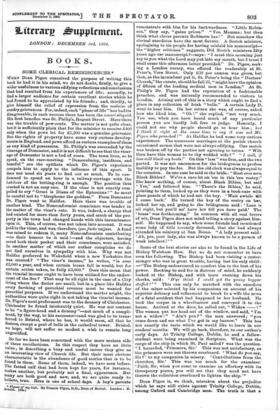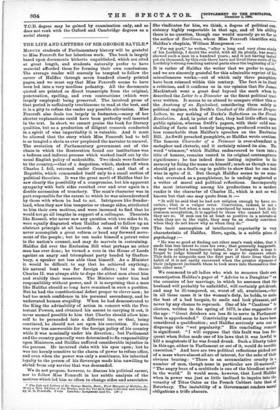BOOKS.
SOME CLERICAL REMINISCENCES.*
WHEN Dean Pigou conceived the purpose of writing this book he had it in his mind, we do not doubt, firstly, to give a wider usefulness to various edifying reflections and conclusions that had resulted from his experiences of life ; secondly, to find a larger audience for certain excellent stories which he had found to be appreciated by his friends ; and, thirdly, to give himself the relief of expression from the malaise of sundrygrievances. For, indeed, each "phase of life" has had its disagreeable, in each success there has been the aniari aliquid. His first benefice was St. Philip's, Regent Street. Here there was the trouble of pew-rents. The matter is not quite clear, but it is sufficiently plain that for the minister to receive 2400 only when the pews let for 21,200 was a genuine grievance. But the rights of property have some very curious develop- ments in England, and pews afford as curious examples of them as any kind of possession. St. Philip's was succeeded by the vicarage of Doncaster, and it is not difficult to see that the vicar- age of Doncaster is not a bed of roses. The town lives, so to speak, on the race-meeting. " Demoralising, insidious, and baneful" are the epithets which Dr. Pigou's experience compels him to apply to the influence of this sport. It does not need six years to find out so much. To be con- demned to spend an hour in a railway-carriage with the habitues of the betting-ring is enough. The position thus created is not an easy one. If the vicar is not exactly com- pelled to cry " Great is Diana of the Ephesians ! " he must be careful not to " blaspheme the goddess." From Doncaster Dr. Pigou went to Halifax. Here there was trouble of another kind. The Nonconformist conscience was tender in the matter of the vicar's rate. It was, indeed, a charge that had existed for more than forty years, and much of the pro- perty in the town had changed hands with this inoumbrance upon it. This, of course, was not taken into account. It was paid to the vicar, and was, therefore, ipso facto unjust. A fund was raised to redeem it, many Nonconformists contributing —to their honour be it said !—and the objectors, having saved both their pocket and their conscience, were satisfied. In another matter of which our author complains we do not find ourselves in sympathy with him. Why was not Halifax preferred to Wakefield when a new Yorkshire See was created ? " The vicar's income," he writes, " is over 22,000 a year, and when certain leases fall in would, but for certain action taken, be fully £3,000." Does this mean that the vicarial income ought to have been utilised for the endow- ment of the See ? That may be all right in the case of a City living where the duties are small, but in a place like Halifax every farthing of parochial revenue must be wanted for parochial purposes. If we understand the matter aright, the authorities were quite right in not taking the vicarial income. Dr. Pigon's next preferment was to the deanery of Chichester. Chichester he found intolerably quiet. He was not content to be "a figure-head and a dummy "—not much of a compli- ment, by the way, to his successor—and was glad to be trans- ferred to Bristol, where he has, it would seem, all that he desires, except a peal of bells in the cathedral tower. Bristol, we hope, will not suffer so modest a wish to remain long ungratified.
So far we have been concerned with the more serious side of these recollections. In this respect they have no little value ; in describing a busy and useful career they give us an interesting view of Church life. But their most obvious characteristic is the abundance of good stories that is to be found in them. Some of them, indeed, we have seen before. The fatted calf that had been kept for years, for instance, makes another, but probably not a final, appearance. But many are both good and new, and, we are quite ready to believe, true. Here is one of school days. A boy's parents
• Phases of my Life. By Francis Pigott, D.D., Dean of Bristol. London t E. Arnold. Ilea]
remonstrate with him for his backwardness. " Little Robin- son," they say, "gains prizes." "Yes, Mamma ; but then think what clever parents Robinson has !" But somehow the clerical anecdotes have the most flavour. A Scotch minister, apologising to his people for having mislaid his manuscript— the "higher criticism" suggests, Did Scotch ministers fifty years ago use manuscript ?—says : "I must this morning just say to you what the Lord may put into my mouth, but I trust I shall come this afternoon better provided." Dr. Pigou, seek- ing a London curacy, was offered the readership at St. Peter's, Vere Street. Only £30 per annum was given, but then, as the incumbent put it, St. Peter's being the " Doctors' Church," the curate, should he fall ill, " might have the opinion of fifteen of the leading medical men in London." At St. Philip's Dr. Pigou had the reputation of a fashionable preacher, and was naturally recommended to visitors to London. Arising out of this is a story which ought to find a place in any collection of Irish " bulls." A certain Lady D. went to hear him. On her return she was, of course, asked how she liked him. " Oh ! " she replied, "not very much. You see, when you have heard much of any particular person you are hardly left free to judge. Honestly, I could not see why people should go to hear him ; but I think it right at the same time to say it was not Mr. Pigou who preached ! " At Halifax he had some very curious experiences. The numerous marriages at the parish church occasioned scenes that were not always edifying. One match was broken off by the parties not agreeing to terms. " Wilt thou have this woman to be thy wedded wife ? " " I well, if lass will black my boots." On this " lass " was firm, and the two parted. It was not uncommon for the bridegroom to profess inability to pay the fee. But the old clerk was always equal to the occasion. In one case he said to the bride: "Hast ever seen Black Bibles ? We've a rare lot on 'em in this 'ere vestry." She knew nothing, of course, about Blaok Bibles, but said " Yes," and followed him. " There's the Bibles,' he said, pointing to them, locked up as they were in a book-case with glass panels of which he had not the key. Wait awhile tall I come back.' He turned the key of the vestry on her, locked her up, and going to the bridegroom said : Lass is all right, but you'll no' have her till you have paid.' The braes' was forthcoming." In common with all real lovers of wit, Dean Pigou does not mind telling a story against him- self. He happened to say, when some friends had mentioned some lady of title recently deceased, that she had always attended his ministry at San Remo. "A lady present said : Ah, yes, poor lady, she was always known to be a person of weak intellect !' " Some of the best stories are also to be found in the Life of Bishop Walaham How. But we do not remember to have seen the following. The Bishop had been visiting a coster- monger who was in great trouble, having lost his only child : —" The Bishop endeavoured to comfort him to the best of his
power. Rocking to and fro in distress of mind, he suddenly looked at the Bishop, and with tears running down his cheeks, said : D'ye think I could get the young beggar stuffed ?' " This can only be matched with the anecdote of the miner selected by his companions on account of his superior delicacy and refinement to break to a wife the news of a fatal accident that had happened to her husband. He took the corpse in a wheelbarrow and conveyed it to the house. Arrived at the door, he called out, " Widow —! " The woman put her head out of the window, and said, " I'm not a widow !" "Ain't you ?" the man answered ; "you come down and see what I've got in my barrow." This has not exactly the taste which we would like to leave in our readers' mouths. We will go back, therefore, to our author's early days. At Trinity College, Dublin, he and a fellow- student were being examined in Scripture. What was the cargo of the ship in which St. Paul sailed ? was the question. "I hazarded, Prisoners, Sir.' This was not satisfactory, as the prisoners were not thrown overboard. What do you say,
Sir ?' to my companion in misery. Contributions from the churches, Sir.' This was too much for the examiner. Faith, Sir, when you come to examine an offertory with its threepenny pieces, you will see that they need not have thrown the collection overboard to lighten the ship."
Dean Pigou is, we think, mistaken about the prejudice which he says still exists against Trinity College, Dublin, among Oxford and Cambridge men. The truth is that a
T.C.D. degree may be gained by examination only, and so does not rank with the Oxford and Cambridge degrees as a social stamp.























































 Previous page
Previous page